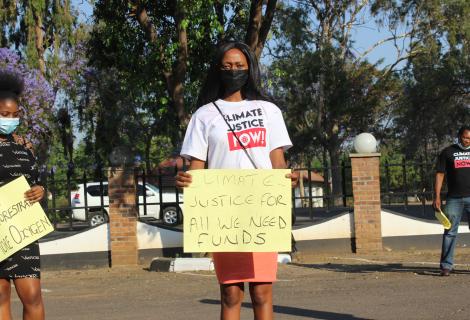Calls upon the government to put in place policies that ensure the protection of the environment

Press Statement
Harare – 5 June – ActionAid Zimbabwe (AAZ) joins the rest of the world in commemorating World Environment Day on 5 June. Led by the United Nations and running under the theme “#OnlyOneEarth", the World Environmental Campaign for 2022 is calling for transformative changes to policies and choices that enable cleaner, greener, and sustainable living in harmony with nature. This is putting a spotlight on the necessity for a global, collective, and coordinated action to tackle environmental problems.
Climate change is one of the world’s defining crises and it is happening even more quickly than feared, posing a threat to the environment, food security, water access, human health, and people’s livelihoods. Zimbabwe has not been spared by the climate crisis, closely linked to environmental challenges. In Zimbabwe mineral extraction on the environment has negatively affected communities’ livelihoods, resulting in poverty, hunger, and displacements, and has also worsened the climate crisis. In addition, the pursuit of industrialised agriculture and the over-reliance on fossil fuels has also contributed to environmental degradation. From increased heat and cold waves, droughts and to cyclones, these life-threatening issues reveal fractures in the country’s current economic policies. The Government of Zimbabwe (GoZ) must therefore prioritise climate financing from the corporates and the north to address the climate crisis.
Through its “Zimbabwe is Open for Business” mantra, the Government has attracted huge investments in the mining sector which have resulted in tax breaks to the corporates at the expense of the communities who are bearing the brunt of environmental degradation. In Zimbabwe, the policies meant to protect the environment and local communities relying on the environment for livelihoods remain poorly implemented and inadequate resulting in women and youth being the most affected. For example, the current extractive processes do not prioritize or implement Environmental Impact Assessments (EIAs) and the participation of communities in these processes is piecemeal.
With the thrust of eradicating poverty across Zimbabwe, AAZ calls upon the Government to establish policies that protect human rights. Given the impact mining activities have on the environment and local communities’ livelihoods, the GoZ should speed up the finalisation of the Mines and Minerals Amendment Bill which will reverse the damages made by mining corporates through the creation of an environmental rehabilitation fund that will be used to rehabilitate the environmental damage and reduce impacts of mining activities on local communities. This must also ensure communities’ right of first refusal especially if the gains under extractives destabilise the environment and can be detrimental to the environment and violate human rights. The current Mines and Mineral Act gives corporates more rights to land than to smallholder farmers and there has always been a perpetual conflict between farmers and miners caused by legal inconsistencies.
The GoZ is bound by Section 73 of the Constitution which partly reads: “Everyone has the right to an environment that is not harmful to their health or wellbeing and right to have the environment protected for the future generations, through reasonable legislation and other measures that prevent pollution and ecological degradation ….” Resultantly, AAZ calls upon the GoZ to fully implement these provisions by aligning all laws and policies with the Constitution.
Communities are integral to preserving the environment and hold the key to a just, green, and feminist future where no one is left behind. The GoZ should adopt policies that encourage the transition to agroecology and other women and youth-led alternatives which are environmentally friendly, promote food sovereignty, and recognise the contribution of smallholder farmers to food security amidst climate change-induced challenges. These must address and not exacerbate inequalities, transform systems to work for nature and the climate, and ensure inclusion and participation.
Recommendations
AAZ calls upon the Government to:
- Finalise the Mines and Minerals Amendment Bill to facilitate the establishment of the Rehabilitation Fund that will ensure meaningful rehabilitation of environmental damage by mining activities which reduces the impact on local communities.
- Facilitate functional Environmental Impact Assessments (EIAs) where communities are consulted properly.
- Expose harmful subsidies and incentives given to mining companies and plough back the resources to gender-responsive public services.
- Continue calling for climate financing and for corporates and the global north to be accountable to commitments for a feminist, green, and just transition.
- Ensure that the Agroecology policy is finalised and adequate resources for its roll out are allocated.
- Support women-led alternatives which help in defending the rights of women, youth, people living with disability, and other vulnerable groups.
For more details please contact:
ActionAid Zimbabwe Country Director, Joy Mabenge: Email joy.mabenge@actionaid.org or Mobile +263 772904479
Twitter: https://twitter.com/ActionAidZim
Facebook: https://www.facebook.com/ActionAidZimbabwe/
Website: https://zimbabwe.actionaid.org/
ENDS//